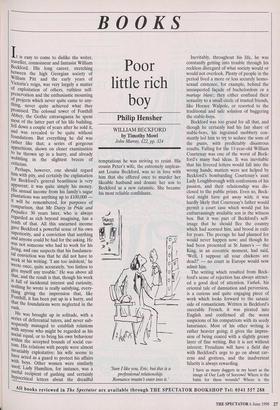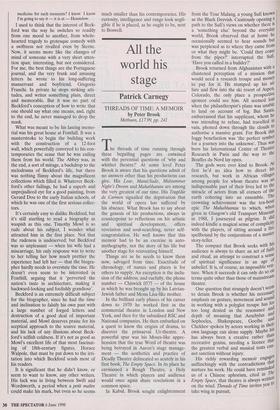BOOKS
Poor little rich boy
Philip Hens her
WILLIAM BECKFORD by Timothy Mowl John Murray, £22, pp. 324 It is easy to come to dislike the writer, traveller, connoisseur and fantasist William Beckford. His long career, stretching between the high Georgian society of William Pitt and the early years of Victoria's reign, was very largely a matter of exploitation of others, ruthless self- preservation and the enthusiastic mounting of projects which never quite came to any- thing, never quite achieved what they Promised. The colossal tower of Fonthill Abbey, the Gothic extravaganza he spent most of the latter part of his life building, fell down a couple of years after he sold it, and was revealed to be quite without foundations. But everything he did was rather like that; a series of gorgeous apparitions, shown on closer examination to be thrown up in a hurry, and already wobbling in the slightest breeze of criticism.
Perhaps, however, one should regard him with pity, and certainly the explanation for Beckford's general beastliness is very apparent; it was quite simply his money. His annual income from his family's sugar Plantations was anything up to £100,000 — it will be remembered, for purposes of comparison, that Mr Darcy in Pride and Prejudice 30 years later, who is always regarded as rich beyond imagining, has a tenth of that. All this unearned income gave Beckford a powerful sense of his own superiority, and a conviction that anything and anyone could be had for the asking. He Was not someone who had to work for his living, and one suspects that his fundamen- tal conviction was that he did not have to Work at his writing. 'I am too indolent,' he Wrote once, quite accurately, 'too listless to give myself any trouble.' He was above all that, and the result is that, though his work iS full of incidental interest and curiosity, flething.- he wrote is really satisfying, every- ng giving the impression that, like ronthill, it has been put up in a hurry, and that the foundations were neglected in the rush.
He was brought up in solitude, with a series of deferential tutors, and never sub- sequently managed to establish relations With anyone who might be regarded as his social equal, or to bring his own behaviour Within the accepted bounds of social cus- tom. His relations with people were almost invariably exploitative; his wife seems to have acted as a guard to protect his affairs With boys. Other women were similarly used; Lady Hamilton, for instance, was a useful recipient of gushing and certainly nYpotritical letters about the dreadful temptations he was striving to resist. His cousin Peter's wife, the extremely unpleas- ant Louisa Beckford, was so in love with him that she offered once to murder her likeable husband and donate her son to Beckford as a new catamite. She became his most reliable confidante.
'Sure I like you, Eric, but this is a professional relationship. Romance mustn't enter into it.' Inevitably, throughout his life, he was constantly getting into trouble through his reckless disregard of what society would or would not overlook. Plenty of people in the period lived a more or less securely homo- sexual existence, for example, behind the unsuspected façade of bachelordom or a manage blanc; they either confined their sexuality to a small circle of trusted friends, like Horace Walpole, or resorted to the traditional and safe solution of buggering the stable-boys.
Beckford was too grand for all that, and though he certainly had his fair share of stable-boys, his ingrained snobbery con- stantly led him to try to seduce the sons of the gratin, with predictably disastrous results. Falling for the 11-year-old William Courtenay was one of the worst of Beck- ford's many bad ideas. It was inevitable that his fevered letters would fall into the wrong hands; matters were not helped by Beckford's bombarding Courtenay's aunt Lady Loughborough with confessions of his passion, and their relationship was dis- closed to the public prints. Even so, Beck- ford might have got away with; it was hardly likely that Courtenay's father would permit a court case which would put his embarrassingly available son in the witness box. But it was part of Beckford's self- image that he should flee the country which had scorned him, and brood in exile for years. The peerage he had planned for would never happen now; and though he had been presented at St James's — the King, in an eccentric moment, had said, 'Well, I suppose all your chickens are dead?' — no court in Europe would now admit him.
The writing which resulted from Beck- ford's sense of rejection has always attract- ed a good deal of attention. Vathek, his oriental tale of damnation and perversion, is a curious and quite engaging piece of work which looks forward to the satanic side of romanticism. Written in Beckford's execrable French, it was pirated into English and confirmed all the worst suspicions of his compatriots with its seedy luxuriance. Most of his other writing is rather heavier going; it gives the impres- sion of being coated with a slightly greasy layer of fine writing. But it is not without interest; Freudians will have a field day with Beckford's urge to go on about cav- erns and grottoes, and the inadvertent hilarity is always rewarding.
I have as many daggers in my heart as the image of Our Lady of Sorrows! Where is the balm for these wounds? Where is the medicine for such torments? I know I know I'm going to say it — it is at — Hounslow.
I used to think that the interest of Beck- ford was the way he switches so readily from one mood to another, from whole- hearted tragedy to grotesque comedy with a swiftness not rivalled even by Sterne. Now, it seems more like the changes of mind of someone with a very short atten- tion span; interesting, but not considered. For me, the best things are the Portuguese journal, and the very frank and amusing letters he wrote to his long-suffering manservant and boyfriend, Gregorio Franchi. In private he stops striking atti- tudes, and writes something plain, direct and memorable. But it was no part of Beckford's conception of how to write that one should say what one means, and, right to the end, he never managed to drop the mask.
What was meant to be his lasting memo- rial was his great house, at Fonthill. It was a masterstroke to begin the building work with the construction of a 12-foot wall, which powerfully conveyed to his con- temporaries the sense that he was exiling them from his world. The Abbey was, in the end, a sort of mirage, a backdrop to the melodrama of Beckford's life, but there was nothing flimsy about the magnificent collections which filled it. Whatever Beck- ford's other failings, he had a superb and unprejudiced eye for a good painting, from Gerard Dou to the early Italian schools, of which he was one of the first serious collec- tors.
It's certainly easy to dislike Beckford, but it's still startling to read a biography as waspish as this one. Timothy Mowl is so rude about his subject, I wonder what attracted him in the first place. Not that the rudeness is undeserved; but Beckford was so unpleasant — when his wife had a miscarriage, his only response was to write to her telling her how much prettier the experience had left her — that the biogra- pher hardly needs to overstate the case. He doesn't even seem to be interested in Fonthill, arguing that it 'perverted the nation's taste in architecture, making it backward-looking and foolishly grandiose'.
Beckford is an extremely difficult subject for the biographer, since he had the time and inclination to falsify his own past with a large number of forged letters and destruction of a good deal of important material, and Mowl deserves praise for his sceptical approach to the source material, and his lack of any illusions. about Beck- ford's selfish coldness. If it's not as good as Mowl's excellent life of that most fascinat- ing of 18th-century figures, Horace Walpole, that must be put down to the irri- tation into which Beckford sends most of his readers.
It is significant that he didn't know, or seem to want to know, any other writers. His luck was in living between Swift and Wordsworth, a period when a petit maitre could make his mark, but even so he seems much smaller than his contemporaries. His curiosity, intelligence and range look negli- gible if he is placed, as he ought to be, next to Boswell.



























































 Previous page
Previous page